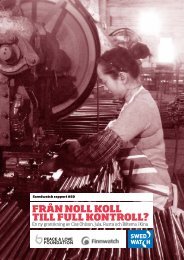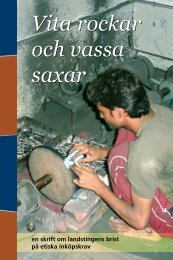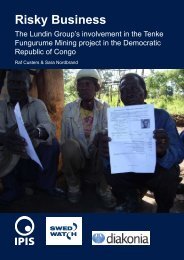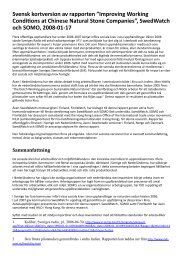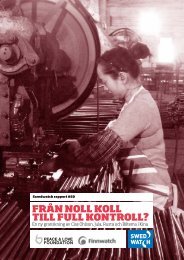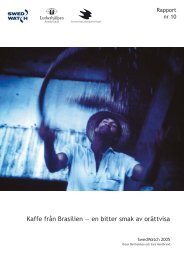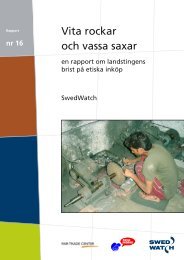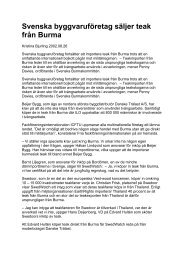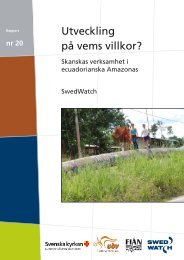4. Case study: Top Toy, Brio and Coop in China - Swedwatch
4. Case study: Top Toy, Brio and Coop in China - Swedwatch
4. Case study: Top Toy, Brio and Coop in China - Swedwatch
You also want an ePaper? Increase the reach of your titles
YUMPU automatically turns print PDFs into web optimized ePapers that Google loves.
5. Conclusion<br />
SwedWatch may with great certa<strong>in</strong>ty establish that the companies <strong>in</strong>directly, through their<br />
suppliers, violate Ch<strong>in</strong>ese legislation, <strong>in</strong>ternational conventions <strong>and</strong> their own codes of<br />
conduct with<strong>in</strong> the toy manufactur<strong>in</strong>g <strong>in</strong> southern Ch<strong>in</strong>a. This is also done to a larger extent<br />
than the Swedish <strong>and</strong> western purchas<strong>in</strong>g companies are aware of. Young migrant workers<br />
who often work 14 hours a day <strong>and</strong> live <strong>in</strong> dormitories <strong>in</strong> connection with the factories have<br />
manufactured the toys that we buy for our children. The wages that they receive are very low,<br />
even by Ch<strong>in</strong>ese st<strong>and</strong>ards. They are often not covered by statutory <strong>in</strong>surance, do not have an<br />
employment contract <strong>and</strong> don't have the possibility to organise. It also seems as though an<br />
unexpected effect of the code of conduct <strong>and</strong> the <strong>in</strong>spection work of the companies is that the<br />
Ch<strong>in</strong>ese suppliers have found sophisticated ways of deceiv<strong>in</strong>g their auditors <strong>and</strong> <strong>in</strong>spectors.<br />
For the last few years, the companies have started to put dem<strong>and</strong>s on their suppliers <strong>and</strong> have<br />
<strong>in</strong> many cases also developed a method to try <strong>and</strong> tackle <strong>in</strong>sufficient work<strong>in</strong>g conditions.<br />
Some improvements of the work<strong>in</strong>g environment <strong>in</strong> the factories can be palpable. Dur<strong>in</strong>g the<br />
last decade, the Ch<strong>in</strong>ese factories have become safer <strong>and</strong> healthier workplaces, which to a<br />
large extent is because western companies have begun to <strong>in</strong>troduce dem<strong>and</strong>s <strong>in</strong> this field.<br />
Despite this, the guest workers cont<strong>in</strong>ue to be completely unaware of their right, which<br />
creates a breed<strong>in</strong>g ground for exploitation. They are often exposed to long work<strong>in</strong>g days, low<br />
wages, an unhealthy work<strong>in</strong>g environment <strong>and</strong> they f<strong>in</strong>d it hard to <strong>in</strong>fluence their work<br />
situation.<br />
HKCIC exam<strong>in</strong>ation shows that the suppliers of the Swedish companies violate several laws<br />
<strong>and</strong> their own codes of conduct;<br />
The s<strong>in</strong>gle most common violation aga<strong>in</strong>st the legislation <strong>and</strong> the codes of conduct relates to<br />
the work<strong>in</strong>g hours. Accord<strong>in</strong>g to HKCIC <strong>in</strong>terviews eight out of the n<strong>in</strong>e exam<strong>in</strong>ed suppliers<br />
violated the Ch<strong>in</strong>ese legislation with regards to work<strong>in</strong>g hours. Five of the plants have almost<br />
14 hour long work<strong>in</strong>g days <strong>and</strong> overtime of about 150 hours per month dur<strong>in</strong>g peak season.<br />
Six out of the n<strong>in</strong>e factories do not have a day off per week dur<strong>in</strong>g peak season. Ch<strong>in</strong>ese<br />
legislation <strong>and</strong> an ILO convention 139 , ratified by Ch<strong>in</strong>a, lays down the right to at least one-day<br />
off per week. At some of the factories the employees work without any time off for several<br />
months <strong>in</strong> a row.<br />
Five out of the n<strong>in</strong>e suppliers do not give a m<strong>in</strong>imum wage guarantee, which means that the<br />
wages may s<strong>in</strong>k to under the m<strong>in</strong>imum wage level dur<strong>in</strong>g off-peak season. The m<strong>in</strong>imum<br />
wage at Dongguan is at present 43,3 Euro/month <strong>and</strong> the m<strong>in</strong>imum wage <strong>in</strong> Shenzhen is 45<br />
Euro/month 140 . NGOs <strong>and</strong> workers that SwedWatch talked to believe that reasonable liv<strong>in</strong>g<br />
wages, that is wages which at least will cover the basic needs, <strong>in</strong> the region are close to 72<br />
Euro 141 . In one of the factories the workers ma<strong>in</strong>ta<strong>in</strong> that the wages can be as low as 19 Euro<br />
dur<strong>in</strong>g the low season.<br />
Eight out of n<strong>in</strong>e factories have a delayed payment of wages between 15 <strong>and</strong> 40 days. This<br />
leads to large f<strong>in</strong>ancial problems for the employees. Accord<strong>in</strong>g to the workers, this delay is<br />
used to stop the workers from leav<strong>in</strong>g the company.<br />
57






